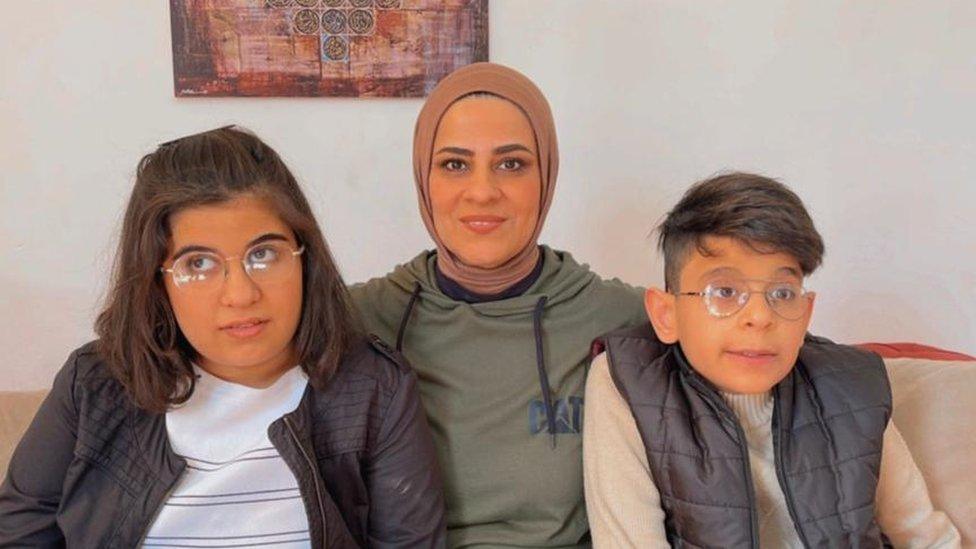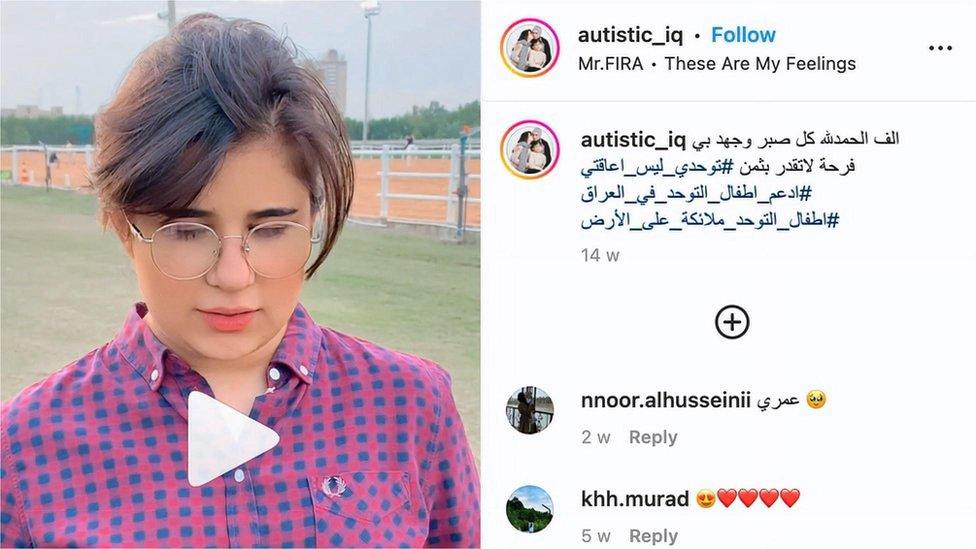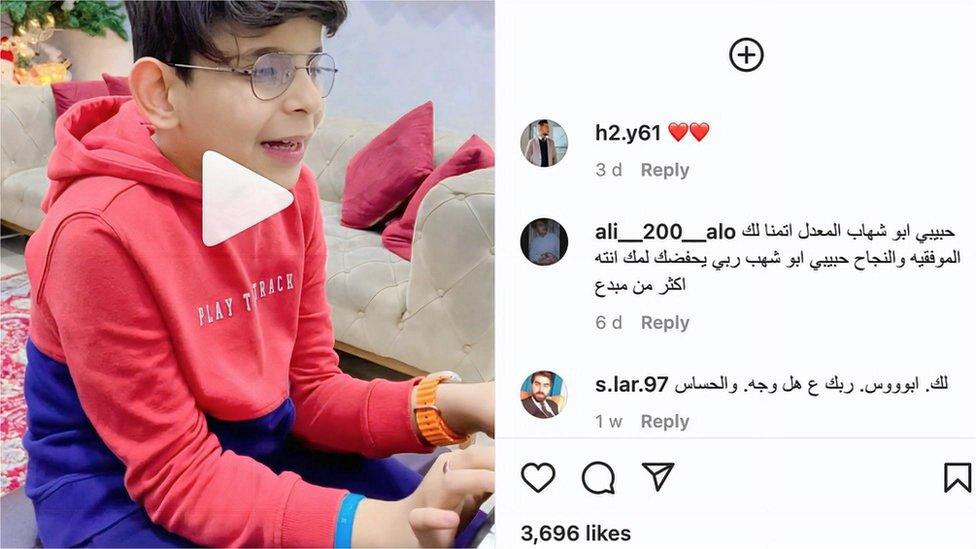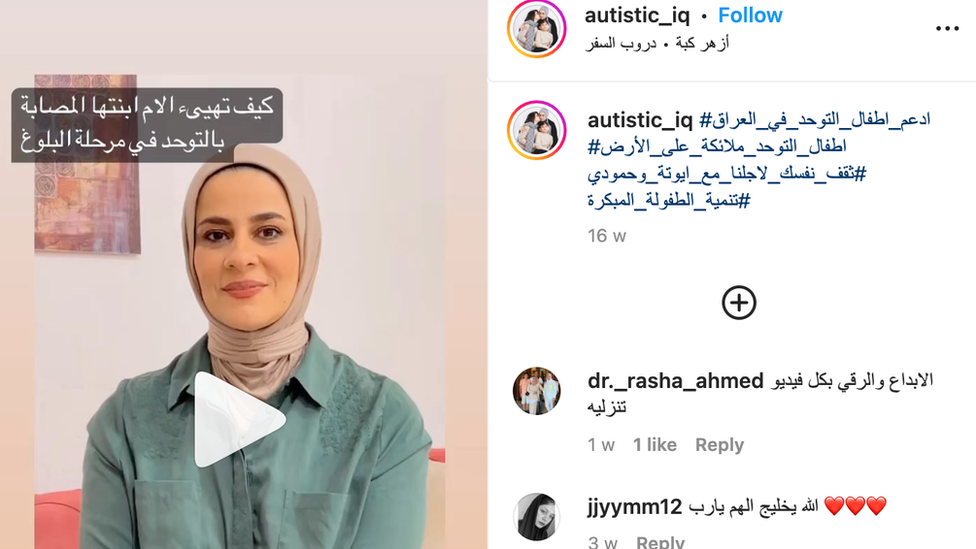The mother bringing autism out of the dark in Iraq
- Published

Shaimaa Alhashimi says she wants to offer hope to other parents like her
Iraqi mother Shaimaa Alhashimi was tired of a lack of understanding towards her two autistic children by a society which preferred to look the other way. So she decided to do something about it by posting videos of her home life - gaining supporters, and critics, along the way.
"Why are you proud of them? They are crazy. And despite their condition, you are making money off your children."
It is an unpleasant comment, typical of the kind posted on Shaimaa Alhashimi's Instagram page by people seeking to shame her.
The trolls are responding to videos uploaded by the mother of two autistic and blind children, who is shattering social taboos by sharing insights into their home life in Baghdad.
"I didn't want other parents to suffer like me and I wanted to offer a glimmer of hope to every mother and father," she says.
Shaimaa radiates calm and now has 144,000 followers but it's been a long road.
"Seventeen years ago, we did not know much about autism, and our understanding was that the child would sit in a corner, is not very social, and speaks very little," the mother-of-three says.
Social stigma
Aya, 17, and Mohammed, 11, are on the autism spectrum. They are also blind due to the incomplete development of the brain's outer layer which affected their optic nerve.

Shaimaa wants to make sure Aya misses out on nothing, including learning to ride a horse
Shaimaa says Aya was four years old when she started showing signs of autism - such as spinning herself around and starting to walk on her tiptoes. There are no official figures for how many children have autism in Iraq and it's often difficult to get a diagnosis.
Shatha Ali Khadum, a psychologist and director of the Babylon Centre for Autism, Speech and Learning Difficulties in Baghdad, estimates about 20,000 children in Iraq are autistic.
But this is probably an undercount as there's a sense of shame associated with having a disability in Iraq and parents would not want their children "labelled" as such.
"There is currently no government support specifically for this group, and there are no government centres or shelters dedicated to them," says Ms Khadum.
When Aya was 11, she experienced an incident in one of those centres, which made Shaimaa decide to take matters into her own hands and home school her.
One day, when Shaimaa was late to pick her daughter up, the girl was left in the guard's room on her own. Shaimaa believes there was an attempt to harass her.
When she was checking Aya's body for any signs of harassment or struggle, she says discomfort was visible on her face and Aya even pushed her mother's hand away.
"Even to this day, when we try to hug Aya, she leaves a small distance, and if we pull her closer to us, she pulls away."
Shaimaa says no specialist school would accept her children, because they were both blind and autistic.
She also ruled out sending them to a private school, though she can afford it, because other parents who had tried to enrol their autistic children said they were not welcomed in class.
"I don't want to make myself or my children go through this situation," says Shaimaa. "When you send an autistic child to school and they feel happy, then lose that feeling, do you know what that does to them?"

Mohammed has learnt to play the piano
This led Shaimaa and her husband to invest their time, effort, and money in developing their children.
Shaimaa got in contact with specialists in the UK, Sweden, and the US, and also brought in a Braille teacher for Mohammed.
Despite his young age, Mohammed has a big role in family life, especially when it comes to his sister Aya.
"If Aya gets anxious, Mohammed calms her down, and if she gets upset, he goes to comfort her," says Shaimaa.
Hurtful encounters
When Shaimaa and her family go out in public, they get a lot of stares.
She recalls an incident in a children's playground where Mohammed was trying to climb up the slide, but not using the stairs. Some parents were worried that their children would try to do the same and hurt themselves.
"As a mother, I wish there was a law to hold such people accountable, especially since these situations have affected my mental health," says Shaimaa. "I would go home, not wanting to go out with my children again."
As a result, Shaimaa got Aya and Mohammed badges which read "I have autism, be patient with me".
Shaimaa gets emotional when she tells me how another mother approached Mohammed one day to read his badge.
The mother then went back to her three children and told them to help Mohammed if he needed it. It's a sign of how society is changing.
Shaimaa created her Instagram page in 2020 after Covid shut all government centres. At the start, she received comments such as "Why does this girl speak so slowly?".
Shaimaa tried to ignore them but then she noticed her followers replying and explaining that Aya has autism spectrum disorder.
Another positive step to a more inclusive world.

In one of her videos, Shaimaa explains how to guide an autistic girl through her first period
One of the hidden sides of autism is the physical and mental pressures parents face.
Mohammed needed two years to learn the piano and Shaimaa repeats words to Aya several times a day to develop her ability to communicate.
"Before, I had an immense fear of what was to come, my children's condition, what will happen to them if I am not around?" she says.
"These thoughts haunt every mother every day. But now, it does not. Instead, I have hope and motivation. Aya relies on herself 70% of the time and Mohammed 90%."
Shaimaa's top tip to parents is patience.
"When you scold them or they sense you are annoyed, it's over. It may be difficult to make progress now but who knows in a year or two."